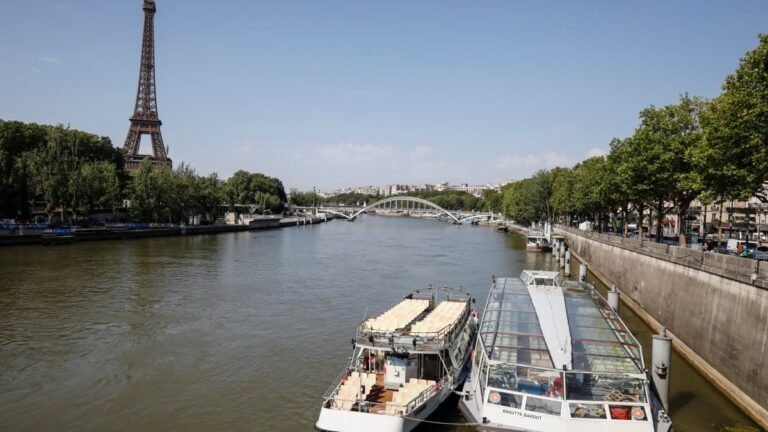The men’s Olympic triathlon, which was due to start on Tuesday morning, has been postponed after tests on water quality in the Seine River showed levels still dangerous to athletes, organisers said.
The event was scheduled to begin at 8 a.m. Tuesday, but according to a post shared on X, Olympic organizers and the World Triathlon Association decided to hold it on Wednesday at 10:45 a.m. That would make the start time about three hours after the women’s event was scheduled to begin, assuming the women’s event is held that day.
“Both triathlons will be subject to upcoming water quality testing to meet World Triathlon swimming standards,” said World Triathlon, the sport’s governing body. “Paris 2024 and World Triathlon reiterate that the health of our athletes remains our top priority. Tests carried out today on the Seine have made it clear that water quality levels are not sufficient to guarantee the event can take place.”
If any races cannot be held on Wednesday, they will be rescheduled for Friday, August 2nd.
“Unfortunately, weather events beyond our control, such as the rain that hit Paris on 26 and 27 July, have altered the water quality which may force us to reschedule the event for health reasons,” a World Triathlon statement read. “Water quality levels have improved in recent hours but remain above permissible limits at several points along the swimming course.”
Concerns over the quality of the Seine’s water led authorities to cancel the swimming portion of the Olympic triathlon training session for a second consecutive day on Monday.
Organizers overseeing the Paris Games were optimistic that triathletes would be able to swim in the city’s famous waterways when competition was due to begin on Tuesday. Organizers also decided to halt swimming training early Monday after a meeting about the quality of the Seine’s water.
World Triathlon, along with medical teams and city authorities, had hoped that clear skies and rising temperatures would bring bacteria levels below legal limits so the cycling and swimming parts of the race, which also includes running, could go ahead. But that had not happened in Paris by Tuesday morning.
France’s Sports Minister Amélie Oudea Castellas told French news channel CNEWS on Monday that authorities were “totally calm about the matter.” Plans put in place to control bacteria levels in the river are effective, but the weather is out of their control, she said.
Officials are hoping for sunny skies and warmer temperatures to keep E. coli levels below the threshold needed to hold the swimming portion of the race, which also includes cycling and running events.
Organizers say if bacteria levels remain high the swimming portion of the race will be canceled and athletes will compete in a duathlon.
Swimming in the Seine has been banned for more than a century, mainly due to its poor water quality, and organizers have spent 1.4 billion euros ($1.5 billion) to improve the river ahead of the Olympics.
Daily water quality tests in early June showed dangerously high levels of E. coli, but have recently shown signs of improvement. Measures taken to improve water quality include the construction of a huge reservoir to capture excess stormwater and prevent wastewater from entering the river, upgrading the sewer infrastructure, and upgrading the wastewater treatment plant.
Paris Mayor Anne Hidalgo took a public swim in the river about two weeks before the Olympic games began, trying to allay concerns about whether the long-polluted waterway would be clean enough to host the swimming events.
Kate Brumbach and Pat Graham of the Associated Press contributed to this report.


